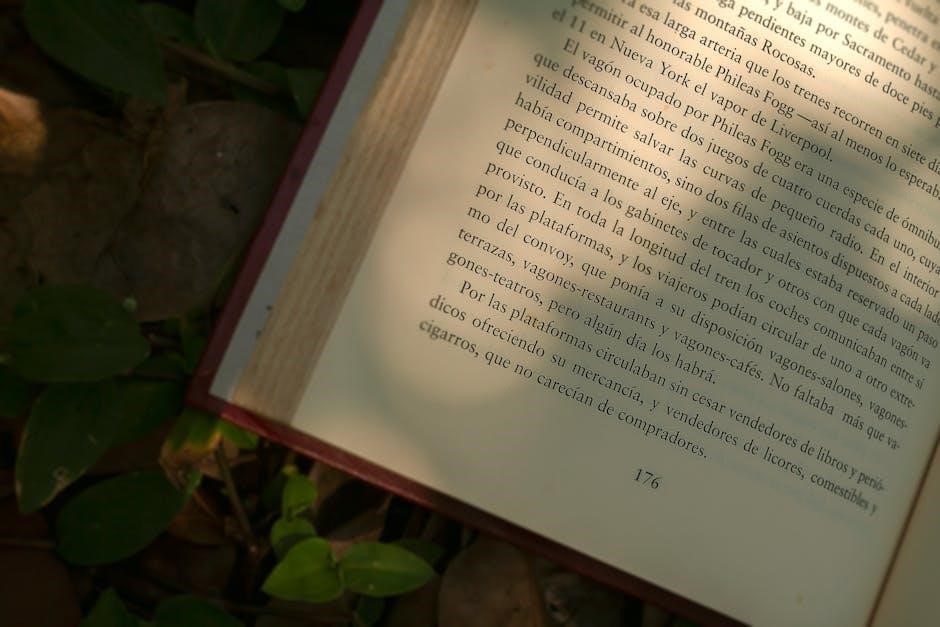Act 3 intensifies the tragic conflict, with Mercutio’s death, Romeo’s banishment, and Juliet’s forced engagement to Paris. Tensions escalate, leading to irreversible consequences.
3.1. Key Events and Turning Points
Act 3 of Romeo and Juliet is marked by pivotal events that alter the course of the story. The fatal duel between Mercutio and Tybalt results in Mercutio’s death, prompting Romeo to avenge his friend by killing Tybalt. This act leads to Romeo’s banishment from Verona, separating him from Juliet. Meanwhile, Juliet’s parents arrange her marriage to Paris, deepening her despair. Juliet defies her parents, refusing to marry Paris, showcasing her growing independence. Friar Lawrence intervenes, offering Juliet a potion to feign death, hoping to reunite her with Romeo. These events escalate tensions, leading to tragic consequences and irreversible decisions. The act underscores the destructive nature of impulsive actions and the inevitability of fate.
3.2. The Tragic Consequences of Impulsive Actions
Romeo’s impulsive decision to avenge Mercutio’s death by killing Tybalt leads to severe repercussions. His actions result in banishment, separating him from Juliet and escalating the families’ hatred. Impulsivity also drives Juliet to defy her parents, refusing to marry Paris, which intensifies her family’s anger. Friar Lawrence’s rushed plan to save Juliet, though well-intentioned, ultimately fails due to the haste and miscommunication. These impulsive choices highlight the destructive nature of acting without foresight, propelling the characters toward their doomed fate. The act underscores how quick decisions, driven by emotion, can lead to irreversible and devastating outcomes, deepening the tragic tone of the play.
Scene-by-Scene Analysis
Act 3 unfolds through pivotal scenes, including the fatal duel, Romeo’s banishment, and Juliet’s forced engagement, each intensifying the conflict and propelling the tragic narrative forward.
3.3. Scene 1: The Fatal Duel Between Mercutio and Tybalt
In Act 3, Scene 1, the tension between the Montagues and Capulets reaches a boiling point. Mercutio, Romeo’s fiery friend, confronts Tybalt, who seeks revenge for Romeo’s presence at the Capulet ball. Despite Romeo’s efforts to calm the situation, Mercutio provokes Tybalt into a duel. Tybalt fatally wounds Mercutio, who dies cursing both families for their senseless feud. Romeo, filled with rage and grief, avenges Mercutio by killing Tybalt. This impulsive act leads to Romeo’s banishment from Verona, intensifying the tragic consequences of the conflict. The scene highlights the destructive nature of hatred and the devastating impact of impulsive decisions, setting the stage for the play’s heartbreaking conclusion.
3.4. Scene 2: Romeo’s Banishment and Its Impact

Following Mercutio’s death, Romeo slays Tybalt in a rage, leading to his banishment from Verona. This sentence devastates Romeo, who believes exile is worse than death, as it separates him from Juliet. Friar Lawrence attempts to comfort Romeo, urging patience and promising a plan to reunite him with Juliet. Meanwhile, Juliet learns of Romeo’s banishment and her parents’ plan to marry her to Paris, deepening her despair. The banishment escalates the conflict, isolating the lovers and forcing Juliet to defy her family. This scene underscores the enduring power of love amid chaos and sets the stage for the tragic events that will unfold. The emotional turmoil and desperate decisions here drive the play’s inevitable tragic conclusion.
3.5. Scene 3: Juliet’s Parents Announce Her Engagement to Paris
In this pivotal scene, Lord and Lady Capulet inform Juliet of her arranged marriage to Paris, intending to lift her spirits after Tybalt’s death. Juliet, however, refuses to accept the engagement, expressing her unwavering love for Romeo. Her defiance shocks her parents, particularly Lord Capulet, who insists the marriage will proceed as planned. Juliet’s refusal to obey intensifies the family conflict, highlighting her determination to follow her heart. The scene underscores Juliet’s growing independence and the societal pressures forcing her into a corner. With no support from her family, Juliet turns to Friar Lawrence for help, setting the stage for her desperate plan to escape the arranged marriage and reunite with Romeo.
Character Development in Act 3
Act 3 showcases Romeo’s emotional turmoil, Juliet’s defiance, and Friar Lawrence’s mediating efforts, highlighting their growth amidst escalating tensions and tragic circumstances in Verona.
3.6. Romeo’s Transformation from Lover to Avenger

Romeo’s transformation from a passionate lover to a vengeful avenger is a pivotal shift in Act 3. Initially, Romeo is portrayed as a romantic and emotional young man, deeply devoted to Juliet. However, the death of his friend Mercutio at Tybalt’s hand triggers a drastic change. Overcome with rage and grief, Romeo abandons his peaceful nature and kills Tybalt in a duel. This act of vengeance leads to his banishment from Verona, isolating him from Juliet and intensifying his desperation. Romeo’s transformation highlights the destructive power of impulsive actions and the overwhelming influence of emotion, setting the stage for the tragic events that follow. His shift from lover to avenger underscores the theme of love and hate as intertwined forces driving the play’s devastating outcome.
3.7. Juliet’s Defiance of Her Parents
Juliet’s defiance of her parents in Act 3 marks a significant turning point in her character development. Initially obedient, Juliet refuses to marry Paris, standing firm against her parents’ wishes. Lord Capulet, angered by her disobedience, threatens to disown her, while Lady Capulet fails to support her daughter. Juliet’s courage grows as she rejects their authority, emphasizing her love for Romeo over familial duty. The Nurse, who once supported Juliet, now betrays her trust by advising her to marry Paris. This betrayal further isolates Juliet, forcing her to rely on Friar Lawrence for help. Her defiance showcases her growing independence and determination to follow her heart, even in the face of severe consequences. This act of rebellion highlights the conflict between familial expectations and personal desire, deepening the tragic tension of the play.
3.8. The Role of Friar Lawrence in Mediating the Conflict
Friar Lawrence plays a pivotal role in Act 3 as a mediator, offering guidance and solutions to the escalating conflict. He comforts Romeo after his banishment, providing wisdom and reassurance. When Juliet faces her parents’ insistence on marrying Paris, Friar Lawrence devises a risky plan to save her by giving her a potion to feign death. His intent is to reunite the lovers and end the feud between their families. However, his well-meaning interventions inadvertently accelerate the tragic outcome. Despite his efforts to mediate, the complexities of the situation and the impulsive actions of others undermine his plans, highlighting the challenges of resolving deep-seated conflicts through reason alone. His role underscores the theme of fate versus free will, as his attempts to control events ultimately fail to prevent the inevitable tragedy.

Themes Explored in Act 3
Act 3 delves into themes of fate vs. free will, love vs. hate, and the consequences of impulsive actions, highlighting the tragic inevitability of the characters’ choices.
3.9. Fate vs. Free Will in the Play
In Act 3, the interplay between fate and free will becomes pivotal. Romeo’s impulsive decision to avenge Mercutio and his subsequent banishment highlight the clash between personal choices and destiny. Juliet’s defiance of her parents, refusing to marry Paris, showcases her exercise of free will, yet it accelerates the tragic outcome. Friar Lawrence’s attempts to mediate further entangle the characters in a web of fate. The chorus’s ominous warnings reinforce the inevitability of their doomed fate. Ultimately, the characters’ choices, driven by love and hate, seal their destiny, illustrating how free will and fate are inextricably linked in the play’s tragic progression.
3.10. Love and Hate as Driving Forces
In Act 3, love and hate emerge as the primary forces driving the characters’ actions. Romeo’s love for Juliet compels him to avenge Mercutio’s death, leading to Tybalt’s murder and his banishment. Juliet’s love for Romeo strengthens her resolve to defy her parents, while her family’s hatred for the Montagues intensifies the conflict. The lethal duel between Mercutio and Tybalt exemplifies how hate escalates violence, while Juliet’s refusal to marry Paris highlights the power of love over societal expectations. The interplay of these emotions creates a tragic cycle, as love unites the lovers but also fuels the hatred that destroys them. Shakespeare illustrates how these forces are inseparable, with love often leading to hate and vice versa, ultimately sealing the characters’ doomed fate.

Study Guide Questions and Analysis
How does Act 3 escalate the conflict? Analyze Romeo’s transformation after Mercutio’s death. What motivates Juliet’s defiance? How does fate influence the characters’ decisions?
3.11. Discussion Prompts and Essay Topics for Act 3
How does Mercutio’s death alter Romeo’s character? What role does revenge play in his actions?
Analyze Juliet’s defiance of her parents. What motivates her decision, and what does it reveal about her maturity?
Discuss the theme of fate vs. free will in Act 3. How do the characters’ choices contribute to the tragic outcome?
How does Friar Lawrence’s plan to reunite Romeo and Juliet reflect his role as a mediator?
What impact does Romeo’s banishment have on the relationships in the play?
Explore the theme of love vs. hate. How do these forces drive the plot and character decisions in Act 3?
Why does Lord Capulet insist on Juliet marrying Paris? What does this reveal about societal expectations?

How does Shakespeare use conflict in Act 3 to build tension and foreshadow future events?
